Contents
There’s really nothing worse than dealing with plantar fasciitis in your feet! Seriously, this is the time to start paying serious attention to the footwear you wear every day. Let’s see, looks like your feet might have to say goodbye to high heels or those stiff, tight leather shoes!
So, what about Crocs? Are Crocs Good For Plantar Fasciitis?
Let’s dive into the answer in this blog with VivaCrocs!
Are Crocs Good for Plantar Fasciitis?
We’re certainly not going to give a simple YES or NO answer to the question, “Are Crocs Good for Plantar Fasciitis?” Instead, the answer is maybe with conditions!
Plantar fasciitis is a disorder that inflames the plantar fascia, a thick band of tissue that runs along the sole of your foot. Crocs can be good for plantar fasciitis, but that comes down to the specific style and how you use them
Although their lightweight construction and cushioned soles may lessen pressure and absorb shock, they might not offer the stability and structured arch support required in more extreme situations!
But…wait a second, we’re getting ahead of ourselves! Let’s dive into the pros and cons of Crocs for plantar fasciitis in the next section!
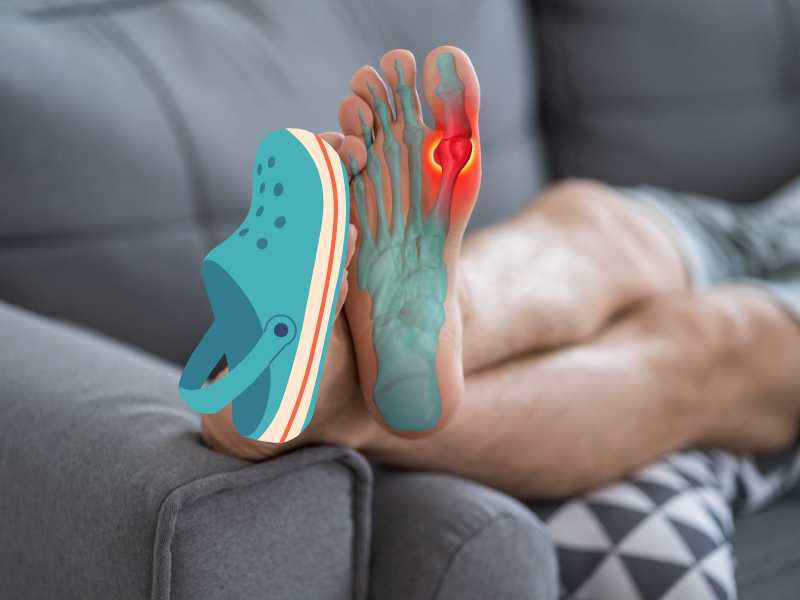
Plantar fasciitis may benefit from wearing Crocs but it actually depends on the style
4 Reason Why Crocs Is The Perfect Option For Your Plantar Fasciitis!
Firstly, let’s talk about the benefits of Crocs for your plantar fasciitis and feet. Are Crocs really as helpful for foot health in general and plantar fasciitis in particular as rumored?
1. Cushioned Footbed And Arch Support
Did you know that Crocs are designed with a soft cushioned footbed that helps absorb shock and reduce pressure on your feet?
Some Crocs brands and models even come with slight arch support which can feel like a godsend for those suffering from plantar fasciitis. Because of this, the cushioning can help ease pain caused by standing or walking for long periods.
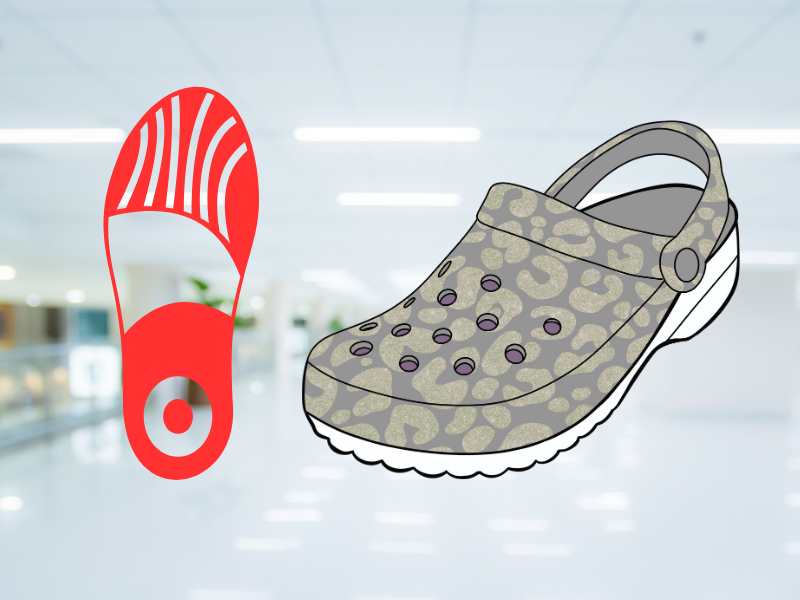
The footbed of Crocs is soft and padded
2. Lightweight And Flexible Design.
Honestly we have to say that heavy shoes are the worst thing.
But compared to other shoes, Crocs are extremely lightweight. This means your feet won’t feel like they’re dragging across the floor with every step. On top of that, the flexibility of the material allows your feet to move more naturally, helps reduce strain on the plantar fascia.
3. Roomy Fit To Reduce Pressure On The Feet.
Besides all the points above, one of the best things about Crocs is their roomy fit.
Unlike tight, restrictive shoes, Crocs give your toes plenty of space to breathe. This helps reduce pressure on your feet and prevents additional discomfort. For those who have both plantar fasciitis and sweaty feet, Crocs are a lifesaver!
Read more: Facts Revealed: Are Crocs Good For Your Feet?
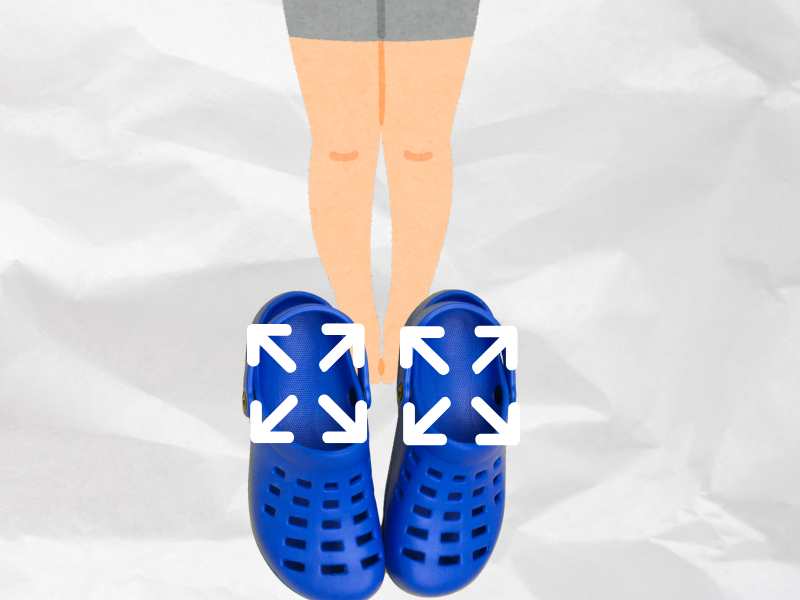
Your toes have plenty of room to breathe in Crocs
4. Shock Absorption And Impact Reduction
We haven’t really talked about the material Crocs are made from although we’ve mentioned it a few times already. Well, that’s Croslite.
The Croslite material used in Crocs is designed to absorb shock and reduce impact on your feet while walking. This can be especially beneficial for those with plantar fasciitis, as it minimizes stress on the plantar fascia.
What Are the Drawbacks and Risks of Crocs for Your Plantar Fasciitis?
We’re guessing you’re about to leave this page and head over to a site like VivaCrocs to treat yourself to a pair of Crocs after reading about all the benefits, right? Hold on! Before you rush to buy a pair, let’s talk about the not-so-great sides of Crocs related to your feet and plantar fasciitis.
1. Lack Of Structured Arch Support
Does it sound a bit contradictory, huh? A moment ago, we were talking about this as a benefit, and now it’s a downside. While some Crocs do offer light arch support, it’s often not enough for those with severe plantar fasciitis. Yes, we said severe.If you have high arches or need more structured support, Crocs might not cut it for you!
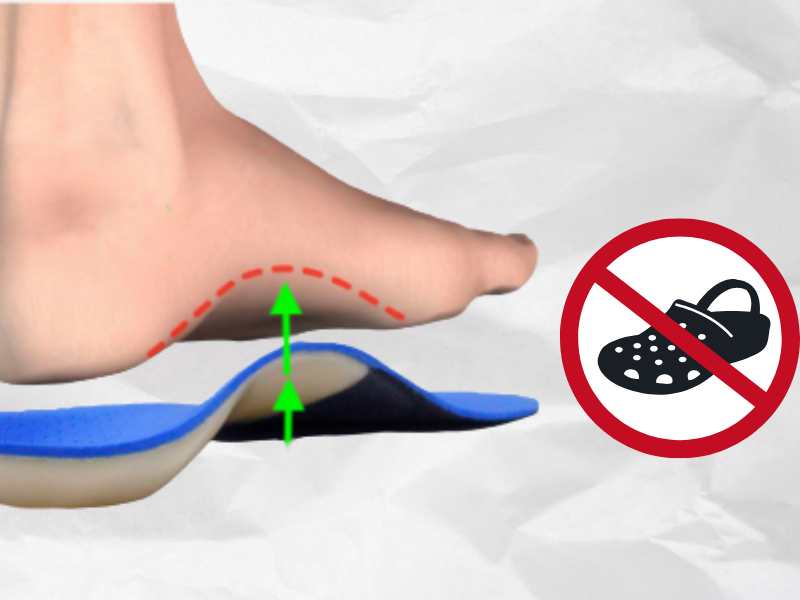
For people with severe plantar fasciitis, the Crocs space is frequently insufficient
2. Limited Stability For Certain Foot Types
Crocs are super soft and flexible, almost like marshmallows: great for comfort, not so great for stability. If you have flat feet or tend to overpronate (your feet roll inward while walking), Crocs might not provide the stability you actually need!
3. Potential For Overpronation Due To Soft Soles
On top of that, Crocs’ soft soles can sometimes make overpronation even worse which adds more strain on your plantar fascia. If you’re prone to overpronation, you might want to think twice before wearing Crocs for extended periods!
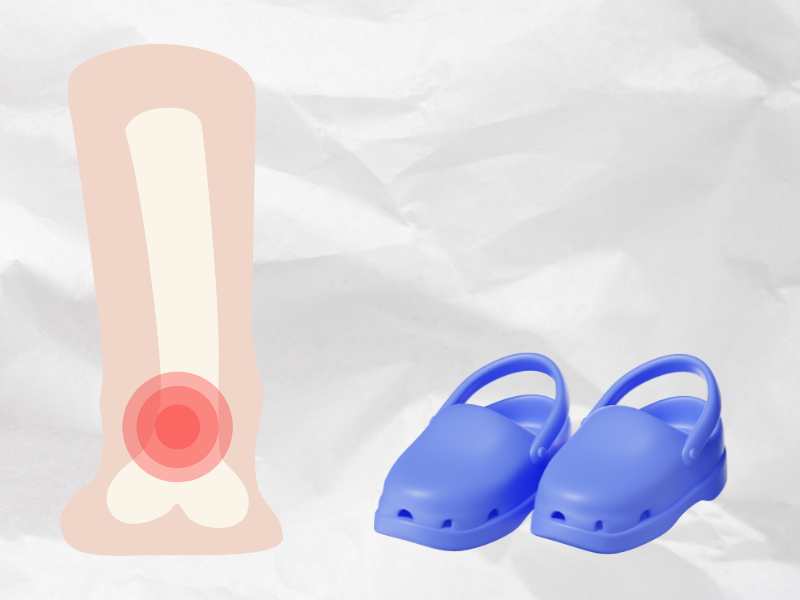
The soft soles of Crocs can occasionally exacerbate overpronation
4. Not Suitable For All-Day Wear Or High-Impact Activities
Taking your dog for a walk? Quick grocery run? Sure, Crocs are totally fine for that. But what if you wear them all day just because they’re convenient? Or using them for high-impact activities like running or working out? Nope, big NO! They’ll only make things worse for your feet and your plantar fasciitis! Once again, Crocs weren’t made to support you through an entire day of repetitive wear!
Best Crocs for Plantar Fasciitis: How to Get Them?
Hmm, so you’re stubborn about getting Crocs even though you have plantar fasciitis? Alright then, if you must have them, here are some things to keep in mind to make them work better for your condition!
1. Selecting Models With Adequate Arch Support
Not all Crocs are made the same as each other. You should look for models offering better arch support, like the Crocs Specialist or Crocs Bistro. These are born for people who spend long hours on their feet and can provide better support for your plantar fascia.
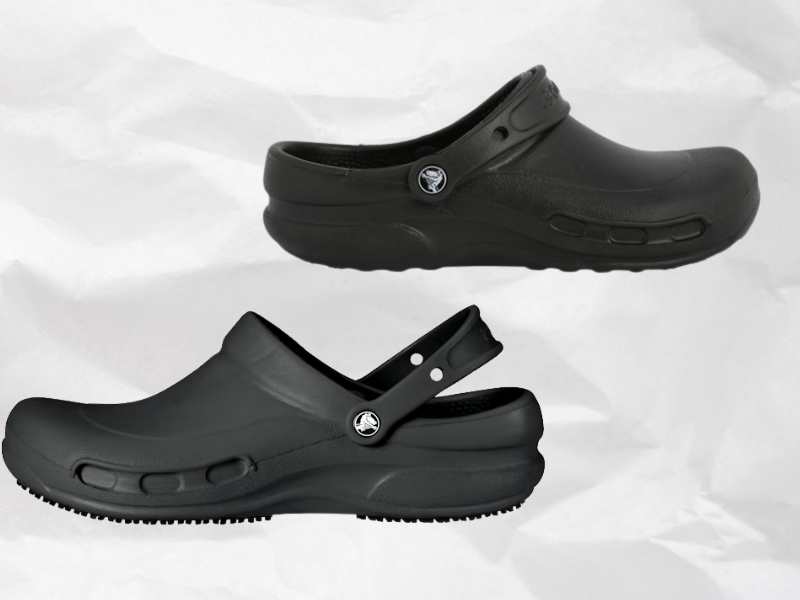
For those who spend a lot of time on their feet Crocs Specialist Crocs Bistro are ideal
2. Ensuring Proper Fit And Sizing
Please, just make sure your Crocs fit properly – not too tight, not too loose.
- If they’re too loose, your foot will slide around which can bring unnecessary strain
- If they’re too tight, they’ll put pressure on your foot and make the pain even worse
So, when you are at the shop, try them on and walk around a bit before deciding!
Otherwise, if you’re buying from VivaCrocs, you can click on the support chat pop-up, and staff will be there to assist and advise you! Check out VivaCrocs now!
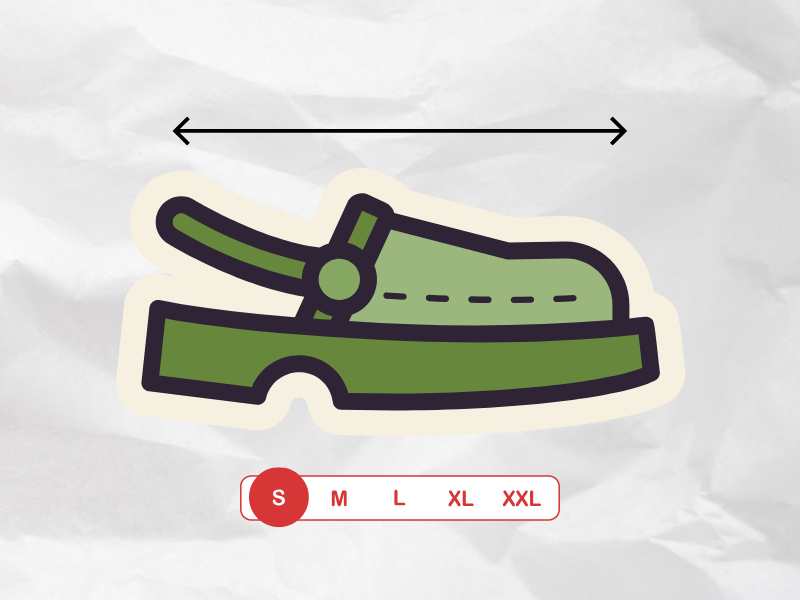
Before making a decision put on Crocs and take a few strolls!
3. Pairing Crocs With Orthotic Inserts For Added Support
If you need more support than Crocs alone can provide, you might want to consider joining orthotic insoles. These inserts will help fill in gaps and provide the arch support and stability your feet need.
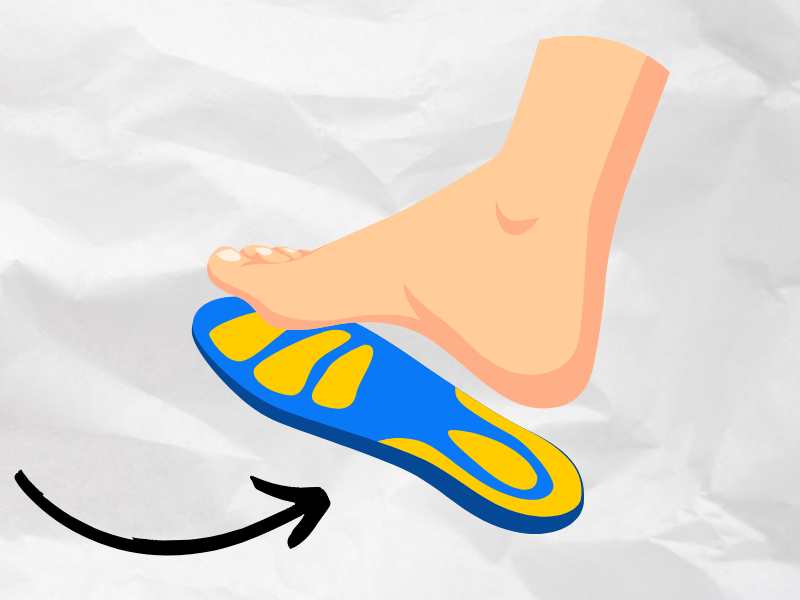
You may wish to think about using orthotic insoles
4. When To Avoid Wearing Crocs
Croc shoes can be useful in certain situations but there are times when you should give them a break. If you have to stand all day or do high-impact activities, it’s better to go with shoes that offer more support!

It is preferable to wear shoes, if you must engage in high impact activities
Alternatives to Crocs for Plantar Fasciitis Relief
Okay, if you’re the type of person who doesn’t like taking risks and won’t buy Crocs anymore… then what now? Don’t worry too much, there are still plenty of other options. Here are some alternatives for you to consider.
1. Other Footwear For Plantar Fasciitis
This is a fine alternative worth spending money on. Some brands like Vionic Brooks and Asics offer shoes specifically designed for people with plantar fasciitis.
These shoes normally provide better arch support and more stability compared to Crocs.
2. Custom Orthotics
This isn’t a must, but if you feel like your condition is getting worse, check out places that sell custom orthotics!
Custom orthotics can be a game changer for people with plantar fasciitis. These are specially designed insoles that are the right support for your feet. They can be expensive, but they’re often well worth the investment!
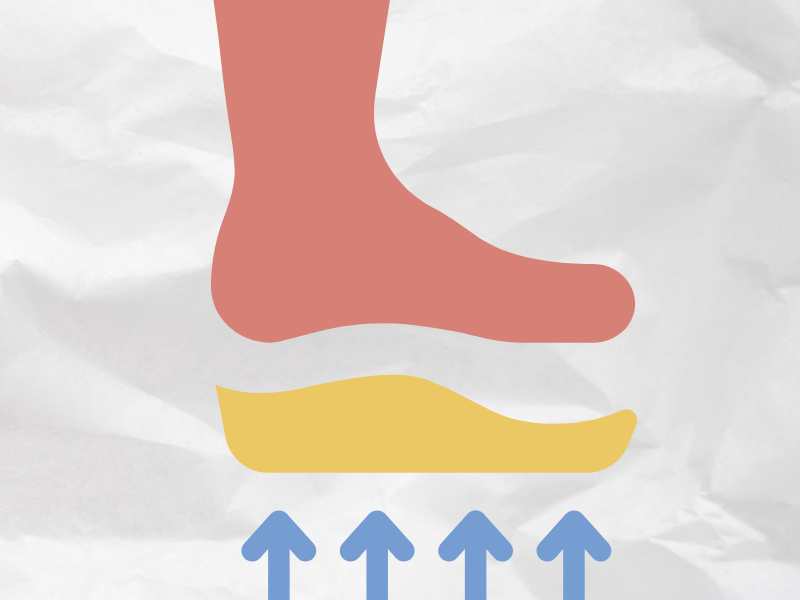
People with plantar fasciitis may find that, custom orthotics alter their lives
3. Non-Footwear Treatments
Besides the way you wear supportive shoes, there are also other treatments that can help relieve plantar fasciitis pain. These include stretching exercises physical therapy and anti-inflammatory medications
But, but…please don’t blindly trust any info and follow whatever advice you find, especially if your plantar fasciitis is getting worse (or already bad). You should meet a doctor and get their opinion first!
FAQS
1. Should I Wear Crocs for My Plantar Fasciitis?
Your particular needs and the severity of your ailment will determine this. Crocs can be a great option for casual or short-term wear but they cannot provide enough support for prolonged use or high-impact sports.
2. What Activities Should Avoid with Plantar Fasciitis?
Some hard exercises like sprinting and jumping should be avoided because they maybe further damage your plantar fascia. Low-impact activities like cycling or swimming are an alternative.
3. What Is The Fastest Way To Cure Plantar Fasciitis?
Plantar fasciitis, unfortunately, cannot be cured quickly. On the other hand, relaxation, stretching and supportive shoes can all hasten the healing process.
Conclusion
In conclusion, there’s no clear-cut answer to the question Are Crocs good for plantar fasciitis? If your condition is still manageable and you just want to wear Crocs for casual, short-term activities, then they should be fine.
On the other hand, if your condition is worsening and your arch is swelling, then Crocs might not be the best choice for your feet right now. In that case, you can temporarily consider the alternatives we’ve listed above.
That said, if the pain is becoming unbearable, you should definitely consult a doctor. That’ll be far more helpful than anything else! Lastly, VivaCrocs hopes your feet recover soon so…you can reunite with your Crocs!





